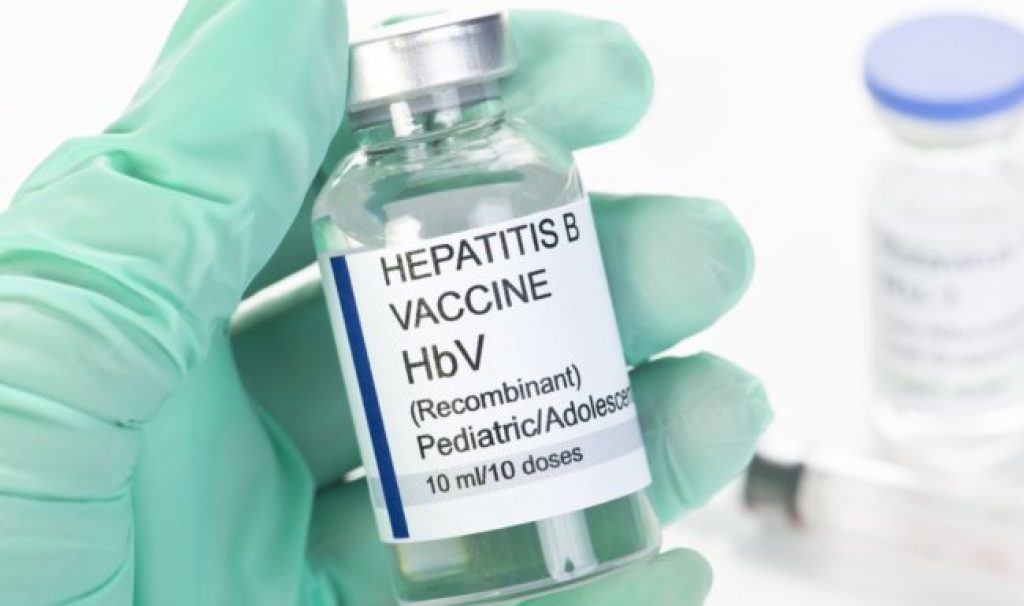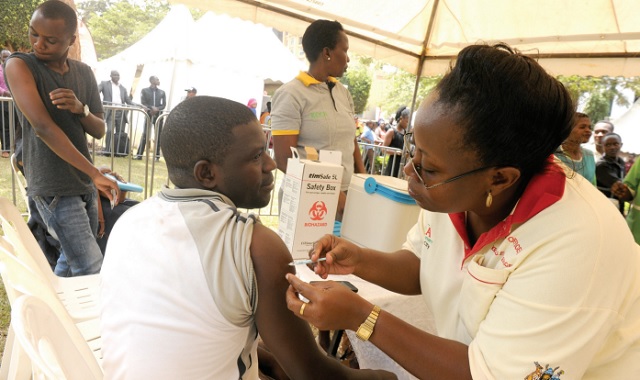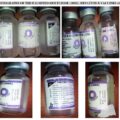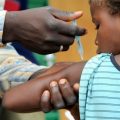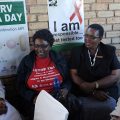Hepatitis B is an infection of your liver. It can cause scarring of the organ, liver failure, and cancer. It can be fatal if it isn’t treated. It’s spread when people come in contact with the blood, open sores, or body fluids of someone who has the hepatitis B virus. Hepatitis B is the only sexually transmitted disease that has a safe and effective vaccine to protect against infection. Hepatitis B is the commonest cause of chronic liver disease in Nigeria. In southern parts of the country, up to 58.1% of patients with chronic liver disease were found HBsAg positive.
The hepatitis B vaccine is an injection (or shot) that is generally given in the arm and as a three-dose series on a 0, 1, and 6-month schedule. The recommended doses depend on the vaccine brand and the person’s age. 1st Shot – At any given time, but newborns should receive this dose in the delivery room. See National Programme on Immunization (NPI) schedule
Who needs hepatitis B vaccine In Nigeria?
All children and adolescents younger than 19 years of age who have not yet gotten the vaccine should also be vaccinated. Hepatitis B vaccine is recommended for unvaccinated adults who are at risk for hepatitis B virus infection, including People whose sex partners have hepatitis B.
Can hepatitis B be cured in Nigeria??
There’s no cure for hepatitis B. Most carriers are contagious meaning they can spread hepatitis B for the rest of their lives. Hepatitis B infections that last a long time may lead to serious liver diseases like cirrhosis and liver cancer. About 1 in 5 people with chronic hepatitis B die from it.
Is hepatitis B curable or treatable?
Chronic hepatitis B is not curable, but it is treatable. Treatment can help to prevent cirrhosis, liver failure and liver cancer by reducing hepatitis B viral load and the loss of HBeAg (either with or without detection of anti-HBe) while improving liver enzyme levels.
Can you live a long life with hepatitis B?
Although those with chronic hepatitis B infection live with an increased risk of developing liver disease later in life, many should expect to live long and healthy lives. Someone with chronic hepatitis B should be seen by a liver specialist every six months, or more often as needed.
How often do you need to be vaccinated for hepatitis B?
The vaccine is usually given as 2, 3, or 4 shots over 1 to 6 months. Infants should get their first dose of hepatitis B vaccine at birth and will usually complete the series at 6 months of age. All children and adolescents younger than 19 years of age who have not yet gotten the vaccine should also be vaccinated.
How long is the hepatitis B vaccine good for?
Studies indicate that immunologic memory remains intact for at least 20 years among healthy vaccinated individuals who initiated hepatitis B vaccination >6 months of age. The vaccine confers long-term protection against clinical illness and chronic hepatitis B virus infection.
What is the schedule for hepatitis B vaccine for adults?
Routine administration schedule for hepatitis B vaccine in adults in Nigeria: The dosing schedule is 0, 1 to 2 months, and 4 to 6 months. At least four weeks between doses #1 and #2. At least eight weeks between doses #2 and #3.
Is hepatitis B vaccine lifelong?
Vaccination with hepatitis B vaccine is the safest and most effective way to prevent hepatitis B infection and its complications. Immunization with three doses of hepatitis B vaccine is believed to result in lifelong immunity from hepatitis B virus infection. Studies indicate that immunologic memory remains intact for at least 30 years among healthy vaccinated individuals who initiated hepatitis B vaccination >6 months of age.
Should adults get Hep B vaccine?
The NCDC also recommends that adults in high-risk groups be vaccinated (see below). Every person may be at some risk for a hepatitis B infection during their lifetime, so getting the hepatitis B vaccine should be considered by all people.
Can you get the hepatitis B vaccine twice?
Yes, the Hepatitis B vaccine is very effective at preventing Hepatitis B virus infection. After receiving all three doses, Hepatitis B vaccine provides greater than 90% protection to infants, children, and adults immunized before being exposed to the virus. Yes, the Hepatitis B vaccine is safe
Can hepatitis B people marry?
People who have hepatitis B can date and marry people who are not infected. As long as they are vaccinated and have enough hepatitis B antibodies to protect them, there is no threat of infection.
Why do babies get hepatitis B vaccine?
All babies should get the first shot of hepatitis B vaccine shortly after birth. This shot acts as a safety net, reducing the risk of getting the disease from moms or family members who may not know they are infected with hepatitis B. This shot works best when the baby gets it within the first 12 hours of his life.
How effective is the hepatitis B vaccine?
After three intramuscular doses of hepatitis B vaccine, more than 90% of healthy adults and more than 95% of infants, children, and adolescents (from birth to 19 years of age) develop adequate antibody responses. However, there is an age-specific decline in immunogenicity.
Can you get hep B from sharing a drink?
Hepatitis B is not spread through kissing, hugging, breastfeeding, sharing eating utensils or drinking glasses, coughing, sneezing, food, water, or casual contact. About 30-50% of persons over age 5 have initial signs or symptoms. Signs and symptoms are less common in children than adults
Is hepatitis B hereditary?
No. Hepatitis B is transmitted like HIV: from an infected mother to her child at birth, through contaminated blood, or through unprotected sex. Hepatitis B is NOT a hereditary disease. However, mothers with high HBV DNA levels or who test positive for HBsAg are at the greatest risk of infecting their newborns.
Is Hep B vaccine necessary?
Hepatitis B vaccination is recommended for all babies to protect them from this serious but preventable disease. Babies and young children are at much greater risk for developing a chronic infection if infected with the hepatitis B virus, but the vaccine is highly effective in preventing the infection.
Where To Get Hepatitis B Vaccine In Nigeria
In 2016, the World Health Organization (WHO) set targets for the elimination of viral hepatitis as a public health threat by 2030 and provided a global health sector strategy (GHHS) on viral hepatitis for 2016–2021 that has since been adopted and endorsed by 194 countries. Nigeria joined the league of other nations to sign up to the GHSS and was among the few countries in Africa to develop firm goals towards the elimination of viral hepatitis. However, vaccination against the hepatitis B virus (HBV) in Nigeria is lower than in many Sub-Saharan African countries. In Nigeria, HBV is reported to be the most common cause of liver disease. However, the extent of HBV exposure among Nigerians at average risk is unknown. The level of current infection is estimated to be 23 million in Nigeria according to current Nigerian treatment guidelines. You get Hepatitis B Vaccine In Nigeria from the following centres:
National Programme on Immunization (NPI)
Address: Address: Plot 297, Shehu Yar’Adua Way, Utako District, Abuja. Address: Plot 964 Off Aminu Kano Way Zone A7, Wuse, Abuja.
National Primary Health Care Development Agency
Address: Plot 964 Off Aminu Kano Way Zone A7, Wuse, Abuja.
Hospitals
Delta State University Teaching Hospital (DELSUTH), Oghara, Delta State
Lagos University Teaching Hospital (LUTH), Idiaraba, Lagos State
Olabisi Onabanjo University Teaching Hospital, Sagamu (OOUTH), Sagamu, Ogun State
University College Hospital, Ibadan (UCH), Oyo State
University Teaching Hospital, Enugu (UNTH), Enugu State
University of Ilorin Teaching Hospital, Ilorin, (UITH), Kwara State
University of Maiduguri Teaching Hospital, Maiduguri, (UMTH), Borno State
Jos University Teaching Hospital, Jos (JUTH), Plateau State
Usmanu Danfodiyo University Teaching Hospital, Sokoto, (UDUTH), Sokoto State,
University of Uyo Teaching Hospital Akwa-Ibom State
Nnamdi Azikiwe University Teaching Hospital, Nnewi, Anambra
University of Calabar Teaching Hospital (UCTH), Calabar
Ebonyi State University Teaching Hospital
University of Benin Teaching Hospital, Benin City
Irrua Specialist Teaching Hospital, Irrua
Also See: Meningitis Vaccine in Nigeria
Enugu State University Teaching Hospital Parklane Enugu
Imo State University Teaching Hospital (IMSUTH), Orlu
Ahmadu Bello University Teaching Hospital, Shika, Zaria
Aminu Kano Teaching Hospital, Kano
Lagos State University Teaching Hospital (LASUTH), Ikeja, Lagos
Ladoke Akintola University Teaching Hospital, Osogbo
University of Port Harcourt Teaching Hospital, Port Harcourt
Obafemi Awolowo University Teaching Hospital, Ile-Ife
Federal Medical Centre, Abakaliki, Eboyin State.
Federal Medical Centre, Abeokuta, Abeokuta, Ogun State.
Federal Medical Centre, Asaba, Delta State.
Federal Medical Centre, Azare, Bauchi State.
Federal Medical Centre, Bida, Niger State.
Federal Medical Centre, Birnin-Kebbi, Kebbi State.
Federal Medical Centre, Birnin-Kudu, Jigawa State.
Federal Medical Centre, Ebute-Meta, Lagos State.
Federal Medical Centre, Gombe, Gombe State.
Federal Medical Centre, Gusau, Zamfara State.
Federal Medical Centre, Ido-Ekiti, Ekiti State
Federal Medical Centre, Jalingo, Taraba State.
Federal Medical Centre, Kastina, Katsina State.
Federal Medical Centre, Keffi, Nasarawa State.
Federal Medical Centre, Lokoja, Kogi State.
Federal Medical Centre, Makurdi, Benue State.
Federal Medical Centre, Nguru, Yobe State.
Federal Medical Centre, Owerri, Imo State.
Federal Medical Centre, Owo, Ondo State.
Federal Medical Centre, Umuahia, Abia State.
Federal Medical Centre, Yenagoa, Bayelsa State
Federal Medical Centre, Yola, Adamawa State. SEE: Ebola Vaccine


